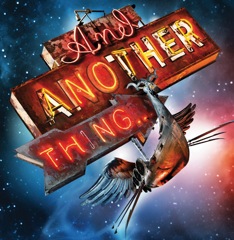 I immensely enjoyed and was immensely annoyed by Eoin Colfer’s new book, “And Another Thing,” his reverent yet irreverent love offering to Douglas Adams’s Hitchhiker’s Guide To The Galaxy series. I’ve always respected Colfer as a writer. His ideas are fresh and his stories are lean and fast paced, never wasting time with heavy exposition or overly detailed descriptions. That’s why I was so surprised by the slow, almost dragging pace of this, his first book for adults. There were moments when I wanted to skip ahead a few pages–especially when he dragged out the long and often pointless Guide entries.
I immensely enjoyed and was immensely annoyed by Eoin Colfer’s new book, “And Another Thing,” his reverent yet irreverent love offering to Douglas Adams’s Hitchhiker’s Guide To The Galaxy series. I’ve always respected Colfer as a writer. His ideas are fresh and his stories are lean and fast paced, never wasting time with heavy exposition or overly detailed descriptions. That’s why I was so surprised by the slow, almost dragging pace of this, his first book for adults. There were moments when I wanted to skip ahead a few pages–especially when he dragged out the long and often pointless Guide entries.
In Adam’s last Hitchhiker book, our heroes were left on an exploding Earth, clearly all very dead. “And Another Thing” finds them all mysteriously at the end of long and full lives, looking back with some confusion on the past. This mystery is soon, and brilliantly solved and the action catapults into . . . three very long and dull subplots that don’t seem to go anywhere. Adams often had random and very anti-climatic things happen in his stories, but at least the action didn’t let up. I think Colfer has confused Adam’s “anything can and will happen” approach to storytelling with an “anything can and will be explained in long and pointless exposition while the characters sit around and do nothing” one. Arthur Dent, for instance, spends the majority of the book sitting on a bed talking to a computer.
The characters are also a bit skewed. Though their voices are largely intact, they don’t always act the right way. Zaphod is dumb, but this time he’s too dumb, Arthur and Ford sit around and are not funny, Eddie the shipboard computer has been replaced by a very obnoxious and confusing “Left Brain,” Marvin is no where to be found and Colfer has dredged up a minor character and done so much modification to him, that he’s unrecognizable, and not half as fun. The best characters in this book are of Colfer’s own creations. Thor the Thunder-god is strangely coherent and meek, with a hammer that plays rock music while he fights, and the small group of refugee human retirees and their personal trainers is on par with the sanitary specialist from “The Restaurant at the End of the Universe.”
I’ll admit, it felt good to be back in Adams’s universe, and I had forgotten how much I missed theses characters. There’s also some true comic genius at work here. There were four or five moments where I found myself laughing out loud. There are also sections so dull, so overwritten and expositional, that it feels as if this was still the writer’s first draft. If Colfer writes book 7, which I hope he will, he should definitely focus more on plotting and less on aping Douglas’s Guide narration, as good as he can be at it about half the time.
SLIGHT SPOILER: Those who were depressed by the nihilistic ending of “Mostly Harmless” are in for another bad surprise. Colfer really hasn’t fixed anything.
